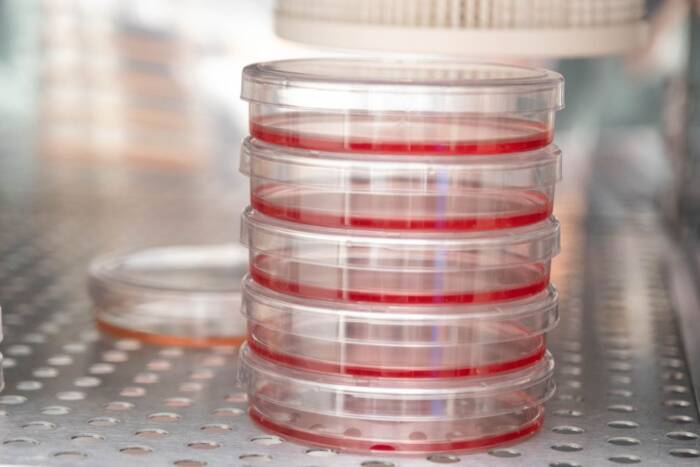Is metastasis a hereditary disorder?

Wenbin Mei, a graduate fellow in the Tavazoie lab, and Sohail Tavazoie. (Credit: Lori Chertoff)
Metastasis is the cause of 90 percent of cancer deaths, but scientists have long struggled to identify, much less target, mutations within tumors that enable cancer to spread. A new study in Cell, however, suggests that metastasis may be rooted not in the tumor itself but in the patient’s healthy tissue. The preliminary data suggests that patients with a variant of the PCSK9 gene face a 22 percent risk of metastasis over 15 years, compared to a risk of 2 percent otherwise.
These findings from the laboratory of Sohail Tavazoie, a physician-scientist at Rockefeller, challenge conventional cancer paradigms, suggesting that a predisposition to metastasis may in fact be inherited. And it’s not the first time the Tavazoie lab has upended conventional wisdom. Five years ago, the lab demonstrated that various germline alleles of the APOE gene enhance or suppress melanoma metastasis. With evidence of metastasis predisposition mounting, we sat down with Tavazoie to discuss this radically new thinking in cancer biology and what it means—and doesn’t mean—for patients.
Why does your lab focus on metastasis specifically?
There are millions of cells within a tumor, and only one in 10,000 has what it takes to spread to another organ and form a colony. That we’re up against such an extreme, rare event gives me hope that we will one day learn to prevent it. And, because it leads to the vast majority of cancer deaths, if we can stop it, we can basically beat cancer.
At this point, should we be thinking of metastasis as a kind of hereditary disorder?
Metastasis now seems to be (at least in part) a hereditary disorder. And that’s completely new for me. It’s not how I, or the field at large, ever thought about cancer biology.
We always thought that metastasis happens because people get a mutation in the tumor itself. But after searching tumors for decades, looking for a mutation that can explain metastasis, cancer biologists came up empty. No one has ever found a real causal human mutation that actually promotes metastasis in the tumor. So we began to hypothesize that maybe it’s not really the tumor, but the host of the cancer itself—the patient’s own genetics—driving metastasis.
This builds on our group’s previous work. Ben Ostendorf, then a postdoctoral fellow in our lab, found that germline alleles of APOE can enhance or suppress metastasis in melanoma patients. That was our first clue that human germline hereditary alleles can impact outcomes. And now, remarkably, work in our lab from Wenbin Mei, a current graduate fellow in our lab, took an entirely different approach, yet came to a similar conclusion in breast cancer metastasis.
Two different approaches, from two different scientists, on two different cancers: what we’re seeing repeatedly is that inherited genetics contributes to cancer metastasis. This makes me wonder whether the same pathway is related to the spread of other cancers as well.
So what is the gene driving breast cancer metastasis and how common is it?
We found that a hereditary variant of the PCSK9 gene (rs562556, V474I), which is present in about 70 percent of white women, is associated with differences in breast cancer survival. After demonstrating that the variant causes metastasis in engineered mice, and determining the mechanism by which it does so, our collaborators in Sweden helped translate our findings with human data. Those findings suggest that cancer patients born with certain forms of the variant have a 22 percent risk of metastatic relapse over 15 years, while others with forms have only a 2 percent risk.
The good news is that PCSK9 is a well-studied gene, and a drug that targets this variant is already approved for treating cardiovascular disease. In preclinical models, we demonstrated that this drug can suppress metastasis. Given that it’s a very safe, widely used drug, we could envision using this antibody in future clinical trials for high-risk women to prevent metastasis.
Would you recommend that people test for PCSK9? And if they are found to carry it, how concerning is that?
It may make sense for patients diagnosed with breast cancer to enroll in trials where they undergo PCSK9 genotyping and, if they have the variant of concern, they may undergo treatment with an anti-PCSK9 antibody in clinical trials.
But this is not another BRCA—our findings are not akin to discovery of germline genetic tumor suppressor genes. It is important to note that the PCSK9 variant does not make people more likely to develop cancer, but instead may determine metastasis outcomes for people who already have cancer. And even for breast cancer patients, there’s no reason to conclude that “if I have the bad form of the gene, I’m going to die.” That’s not the case at all. Remember, there’s a form of the gene that gives you a 2 percent risk of metastasis, and another form that gives you a 22 percent risk. The majority of breast cancer patients are still never going to develop metastasis. I really want to emphasize that our findings are not cause for alarm.
The takeaway for us is that we believe we are beginning to understand the process of metastasis, and that an existing antibody could provide a potential therapy that should be tested in clinical trials.



